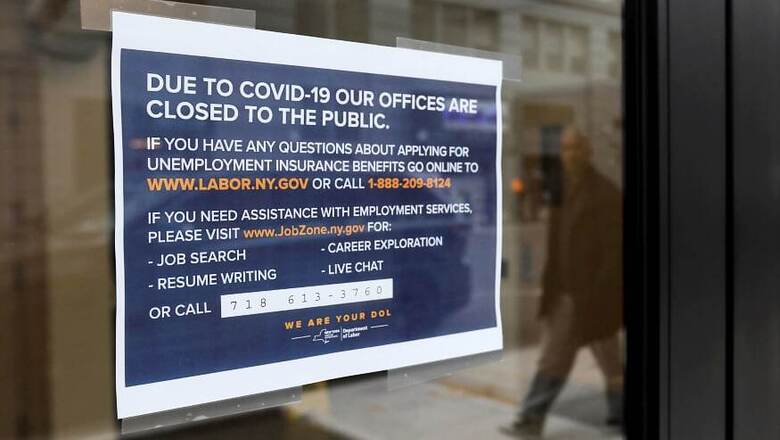
views
The United States became the first country to report more than 2,000 coronavirus deaths in a single day, marking a grim milestone as billions around the world celebrated the Easter holiday weekend under lockdown from home.
The global death toll from the virus surged past 103,000 on Friday, with the United States quickly becoming the epicentre of the pandemic that first emerged in China late last year.
Europe has so far shouldered the majority of all deaths and infections -- though there were signs of hope the curve could be starting to flatten in some of the hardest-hit countries.
Numbers out of Madrid offered a glimmer of hope Saturday: 510 new deaths, a dip in fatalities for the third day in a row.
In France, nearly 1,000 new deaths were confirmed Friday but the country reported a drop in the number of intensive care patients for a second day running.
Italy meanwhile said the number of daily deaths was starting to level off -- though the government resisted pressure to lift its lockdown, extending confinement measures until May 3.
With 18,849 dead, Italy has the highest global death toll, but it is likely soon to be surpassed by the United States where fatalities continued to mount this week.
On Friday, the United States reported 2,108 new deaths, the highest daily toll out of any country since the outbreak was first reported in the central Chinese city of Wuhan in December.
With more than half a million reported infections, the United States already has more coronavirus cases than anywhere else in the world.
The global infection rate now stands at more than 1.7 million, though with many countries only testing the most serious cases the numbers are likely far higher.
But President Donald Trump said that with the US infection trajectory "near the peak" and social distancing working well, he was considering ways to re-open the world's biggest economy as soon as possible.
He acknowledged the risk of higher death tolls if businesses restart too soon -- after the World Health Organization on Friday cautioned countries against lifting lockdown measures too quickly.
"But you know what? Staying at home leads to death also," Trump added, pointing to the massive economic suffering for millions of Americans.
It is unclear when that will be possible, with New York Governor Andrew Cuomo saying millions in the state -- the hardest hit in the US -- will have to be tested before it can reopen.
'Unreal silence'
Easter weekend kicked off in near-empty churches around the world as parishioners remained locked in their homes.
More than four billion people -- over half the world's population -- are confined to their homes from New York to Naples to New Delhi as governments scramble to contain the pandemic's deadly march across the globe.
Pope Francis was due to livestream his Easter Vigil from an empty St Peter's Basilica later Saturday, after he presided over an empty Good Friday Service to kick off the holiday weekend.
The pontiff was praised by Italy's prime minister for his "gesture of responsibility" to observe Easter in private.
"We will remember this spring as the one in which, for the first time in history, the pope presided over the general audiences and conducted the Angelus (prayer) by livestream," Giuseppe Conte wrote in Italy's Catholic daily Avvenire.
"His words, although spoken far from Saint Peter's Square, which was wrapped in an unreal silence, have reached everyone."
Worshippers in Rome stocked up on traditional Easter cakes ahead of the weekend, some piling them onto scooters outside of grocery stores, eager to maintain parts of the holiday tradition even from home.
'Deadly resurgence'
Across Europe, government urged citizens to stay home for the weekend, fearing people would flock outdoors to enjoy warm weather or flee to holiday homes.
France deployed some 160,000 gendarmes to patrol busy roads, while Lithuania set up road blocks to prevent travellers from leaving cities.
And Turkey announced with little warning Friday that a 48-hour lockdown order would be in place in dozens of cities, including Ankara and Istanbul, as its virus death toll crept past 1,000.
Shoppers crowded supermarkets in Istanbul late Friday in a rush to stock up on supplies before the curfew started at midnight.
The World Health Organization has warned that prematurely easing lockdown measures -- as has started in central China where to virus first emerged -- could spark a dangerous return of the disease.
"Lifting restrictions too quickly could lead to a deadly resurgence," WHO chief Tedros Adhanom Ghebreyesus warned Friday.
Some countries, especially in Asia, are worried about a possible second wave of infections imported from travellers as life creeps back to normal.
But governments are under pressure to strike a balance between keeping people safe and keeping already battered economies stable.
And while President Trump has discussed a rapid return to economic stability, the US government's top infectious disease specialist Anthony Fauci said that despite signs of progress, "this is not the time... to be pulling back at all" on social distancing efforts.
Great Depression
The pandemic has shaken the global economy, and the International Monetary Fund -- which has $1 trillion in lending capacity -- said it was responding to calls from 90 countries for emergency financing.
It said this week the world now faces the worst downturn since the Great Depression of the 1930s.
G20 energy ministers, meanwhile, pledged to work together to ensure oil market stability after major oil producers agreed to cut output.
A dramatic slump in oil demand, worsened by a Saudi-Russia price war, has sent prices crashing to near two-decade lows in recent weeks.
In much of the developing world, there are fears the worst is still to come.
War-torn Yemen, already suffering one of the world's most acute humanitarian crises, reported its first case.
In Brazil, authorities confirmed the first deaths in Rio de Janeiro's slums, where overcrowding and poor sanitation have raised fears of a catastrophe.




















Comments
0 comment